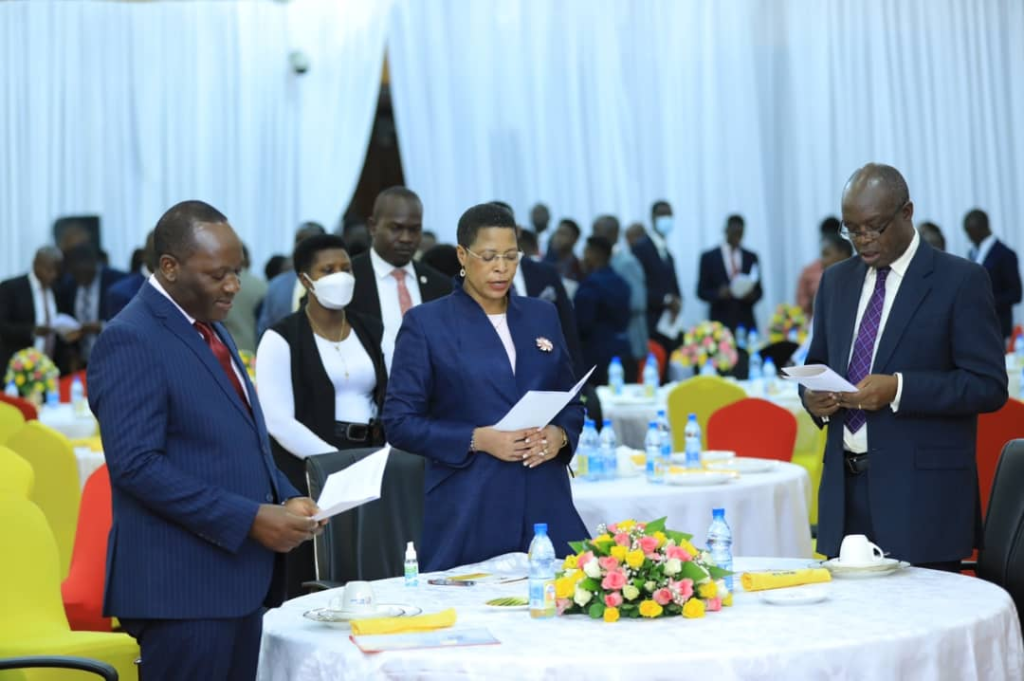
This has been revealed by the speaker of Parliament Anita Among during the ecumenical prayers at parliament this morning organised by different religious sects.
Among says that they can’t allow foreign behaviours to erode away the African Morals under the disguise of human rights and foreign Aid or support.
She called upon MPs to support her during this trying and testing moments to ensure that as the second Arm of government they succeed in passing this bill.
Among further emphasized that voting on this Anti Homosexuality bill will be by show of hands once a members name is read.
She went on to warn foreigners to stop threatening our country that they will cut off aid from us if the country fails to adopt the ‘deadly culture’ (homosexuality) saying that the country can’t allow such an awkward thing to infiltrate our stable culture because of aid.
This will be the second time the bill is tabled on the floor parliament, the first one wasn’t signed by the president because it has some loopholes.
Currently Uganda airwaves have been covered with news of homosexuality especially in schools.

Parliament in 2013 passed the same bill but was later challenged in courts of laws in 2014 on grounds of absence of the required quorum to pass the Bill.
The Anti-Homosexuality Act, 2014 was an act passed by the Parliament of Uganda on 20 December 2013, which prohibited sexual relations between persons of the same sex.
The act was previously called the “Kill the Gays bill” in the western mainstream media due to death penalty clauses proposed in the original version, but the penalty was later amended to life in prison.
The bill was signed into law by the President of Uganda Yoweri Museveni on 24 February 2014. On 1 August 2014, however, the Constitutional Court of Uganda ruled the act invalid on procedural grounds.
The act would have broadened the criminalisation of same-sex relations in Uganda domestically. It also includes provisions about persons outside of Uganda who are charged with violating the act, asserting that they may be extradited to Uganda for punishment there. The act also includes penalties for individuals, companies, and non-governmental organisations that aid or abet same-sex sexual acts, including conducting a gay marriage. Furthermore, the act enables the Ugandan government to rescind international and regional commitments it deems outside of the interest of the act’s provisions.
Same-sex relationships have been illegal in Uganda since colonial rule – as they are in many African countries, especially former British colonies and before this Act was passed, they were punishable by incarceration in prison for up to 14 years. The act was introduced as the Anti Homosexuality Bill, 2009 by Member of Parliament (MP) David Bahati on 14 October 2009. A special motion to introduce the bill was passed a month after a two-day conference was held in which three Christians from the United States asserted that homosexuality is a direct threat to the cohesion of African families.
The international community, however, assailed the law, accusing the Ugandan government of encouraging violence against LGBT people with the law. The United States imposed economic sanctions against Uganda in June 2014 in response to the law, the World Bank indefinitely postponed a $90 million aid loan to Uganda and the governments of Denmark, the Netherlands, Sweden and Norway halted aid to Uganda in opposition to the law; the Ugandan government defended the bill and rejected condemnation of it, with the country’s authorities stating President Museveni wanted “to demonstrate Uganda’s independence in the face of Western pressure and provocation”.
Several sources have noted that the act has exacerbated both the endemic homophobia in Uganda and the associated discussions about it. Others more specifically claim that such legislative actions are the result of politicized homophobia, a rhetorical tool used to further the interests of political leaders in the form of gaining popularity and/or distracting from corrupt behaviour.






